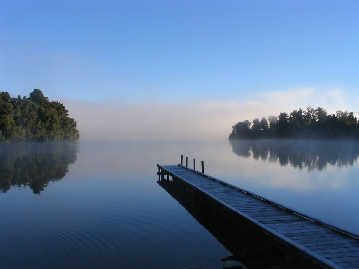Passamos a noite no inexplorado desfiladeiro do Ventana Creek, no braço leste.
Os paredões rochosos e os cumes das montanhas se estendiam em camadas de florestas acima de nós, bordo e sequoia,
Loureiro, carvalho, madrona, até os altos e esbeltos abetos de Santa Lucian que contemplam as cataratas
De rochas escorregadias até os precipícios da cor das estrelas.
Deitamo-nos sobre o cascalho e mantivemos uma pequena fogueira para nos aquecer.
Após a meia-noite, apenas dois ou três carvões reluziam vermelhos na escuridão que arrefecia; coloquei um punhado de folhas secas de louro
Nas extremidades das brasas e as cobri com gravetos ressequidos antes de me deitar novamente. A chama revigorada
Iluminou a face adormecida do meu filho e do seu amigo, assim como a face vertical do paredão do desfiladeiro
Do outro lado do riacho. Folhas leves flutuavam e dançavam ao sopro da fogueira, troncos de árvores eram visíveis: era o paredão rochoso
Que fascinava meus olhos e minha mente. Nada estranho: diorito cinza-claro com duas ou três fissuras oblíquas,
Suavemente polido pelo incessante atrito de deslizamentos e inundações; sem samambaias nem líquens, apenas rocha nua... com se eu estivesse
Vendo uma rocha pela primeira vez. Como se eu estivesse enxergando além da superfície iluminada pelas chamas a rocha real, corpórea
E viva. Nada estranho... Não posso
Dizer o quão estranho: a paixão silenciosa, a profunda nobreza e a beleza infantil: este destino se desdobrando
Além dos nossos próprios destinos. Está aqui na montanha como uma criança sorridente e grave. Eu morrerei, e meus filhos
Viverão e morrerão, nosso mundo continuará com suas rápidas agonias de mudança e descoberta; esta era morrerá,
E lobos uivarão na neve ao redor de uma nova Belém: esta rocha estará aqui, grave, sincera, não passiva: as energias
Que são seus átomos ainda sustentarão toda a montanha acima: e eu, muitos séculos atrás,
Terei sentido a intensa realidade desta rocha solitária, com amor e admiração.
Trad.: Nelson Santander

Oh Lovely Rock
We stayed the night in the pathless gorge of Ventana Creek, up the east fork.
The rock walls and the mountain ridges hung forest on forest above our heads, maple and redwood,
Laurel, oak, madrone, up to the high and slender Santa Lucian firs that stare up the cataracts
Of slide—rock to the star—color precipices.
We lay on gravel and kept a little camp—fire for warmth.
Past midnight only two or three coals glowed red in the cooling darkness; I laid a clutch of dead bay—leaves
On the ember ends and felted dry sticks across them and lay down again. The revived flame
Lighted my sleeping son’s face and his companion’s, and the vertical face of the great gorge-wall
Across the stream. Light leaves overhead danced in the fire’s breath, tree-trunks were seen: it was the rock wall
That fascinated my eyes and mind. Nothing strange: light—gray diorite with two or three slanting seams in it,
Smooth—polished by the endless attrition of slides and floods; no fern nor lichen, pure naked rock... as if I were
Seeing rock for the first time. As if I were seeing through the flame-lit surface into the real and bodily
And living rock. Nothing strange... I cannot
Tell you how strange: the silent passion, the deep nobility and childlike loveliness: this fate going on
Outside our fates. It is here in the mountain like a grave smiling child. I shall die, and my boys
Will live and die, our world will go on through its rapid agonies of change and discovery; this age will die,
And wolves have howled in the snow around a new Bethlehem: this rock will be here, grave, earnest, not passive: the energies
That are its atoms will still be bearing the whole mountain above: and I, many packed centuries ago,
Felt its intense reality with love and wonder, this lonely rock.












